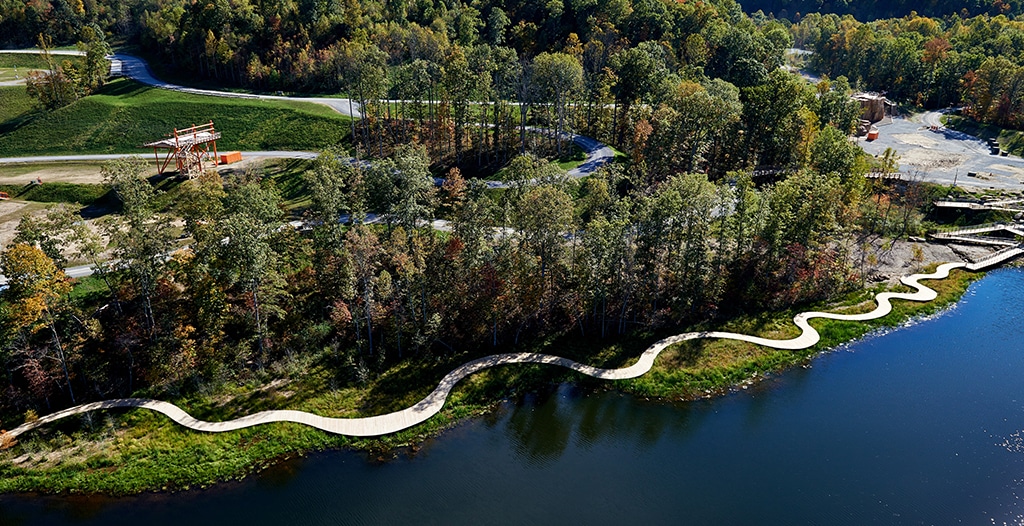
Summit Bechtel Reserve: Gateway to Adventure with York Timber Bridges in West Virginia
Nestled in the breathtaking Appalachian Mountains of West Virginia, the Summit Bechtel Reserve stands as a premier outdoor adventure and conservation center. As the Boy Scouts of America’s high-adventure base, the Reserve offers a dynamic environment for scouts and adventurers alike to explore nature, test their limits, and foster personal growth. Integral to this experience is access—seamless, sustainable, and reliable access to the diverse terrain that defines this 10,600-acre property.
York Bridge Concepts (YBC) was honored to play a pivotal role in this landmark project. YBC’s expertise in designing and constructing timber vehicular and pedestrian bridges helped transform Summit Bechtel Reserve into a harmonious blend of natural splendor and human ingenuity. Our contribution to the Reserve included three HS20-44 vehicular bridges, seven pedestrian bridges, and expansive boardwalk systems that enable scouts, staff, and visitors to traverse the landscape safely and with minimal environmental impact. Let’s take a closer look at how this project came to life, the unique challenges faced, and the lasting impact of YBC’s work on the future of the Summit Bechtel Reserve.
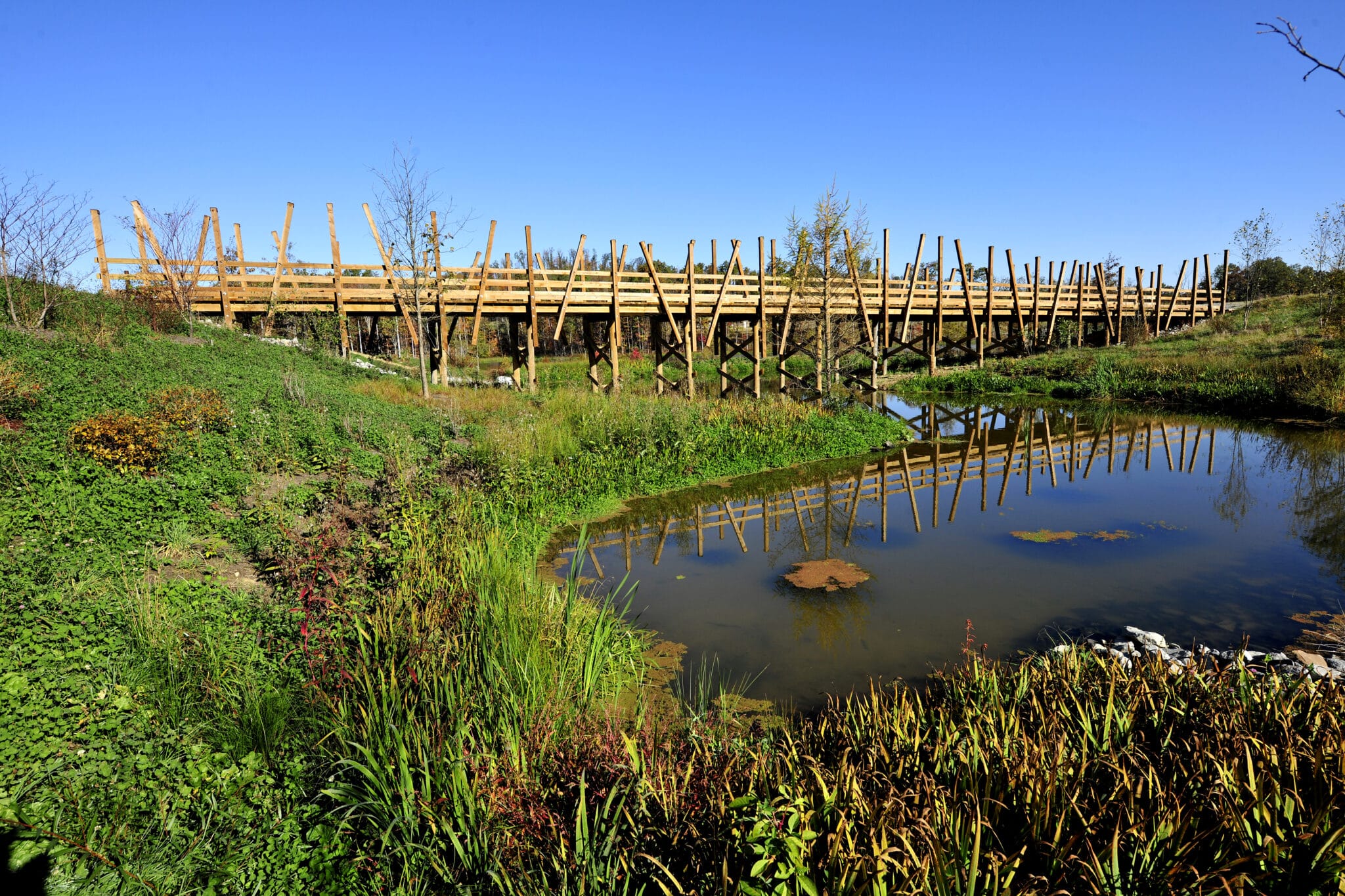
A Visionary Project for a World-Class Adventure Facility
The Summit Bechtel Reserve is far more than just a scout camp. It’s a destination that draws thousands of young men and women annually, offering them access to world-class activities such as zip lining, mountain biking, hiking, climbing, and conservation education. At the heart of this mission is sustainability, ensuring that these natural resources remain pristine for future generations. As such, the infrastructure within the Reserve had to be thoughtfully designed to harmonize with the natural environment while providing long-term durability and accessibility.
The Boy Scouts of America selected York Bridge Concepts for this project due to our proven expertise in crafting timber bridges that are not only aesthetically pleasing but also structurally sound and environmentally conscious. The challenge was to create structures capable of supporting both vehicular and pedestrian traffic while preserving the natural beauty of the landscape. With over 35 years of experience in building sustainable timber bridges, YBC was uniquely suited to tackle this ambitious endeavor.
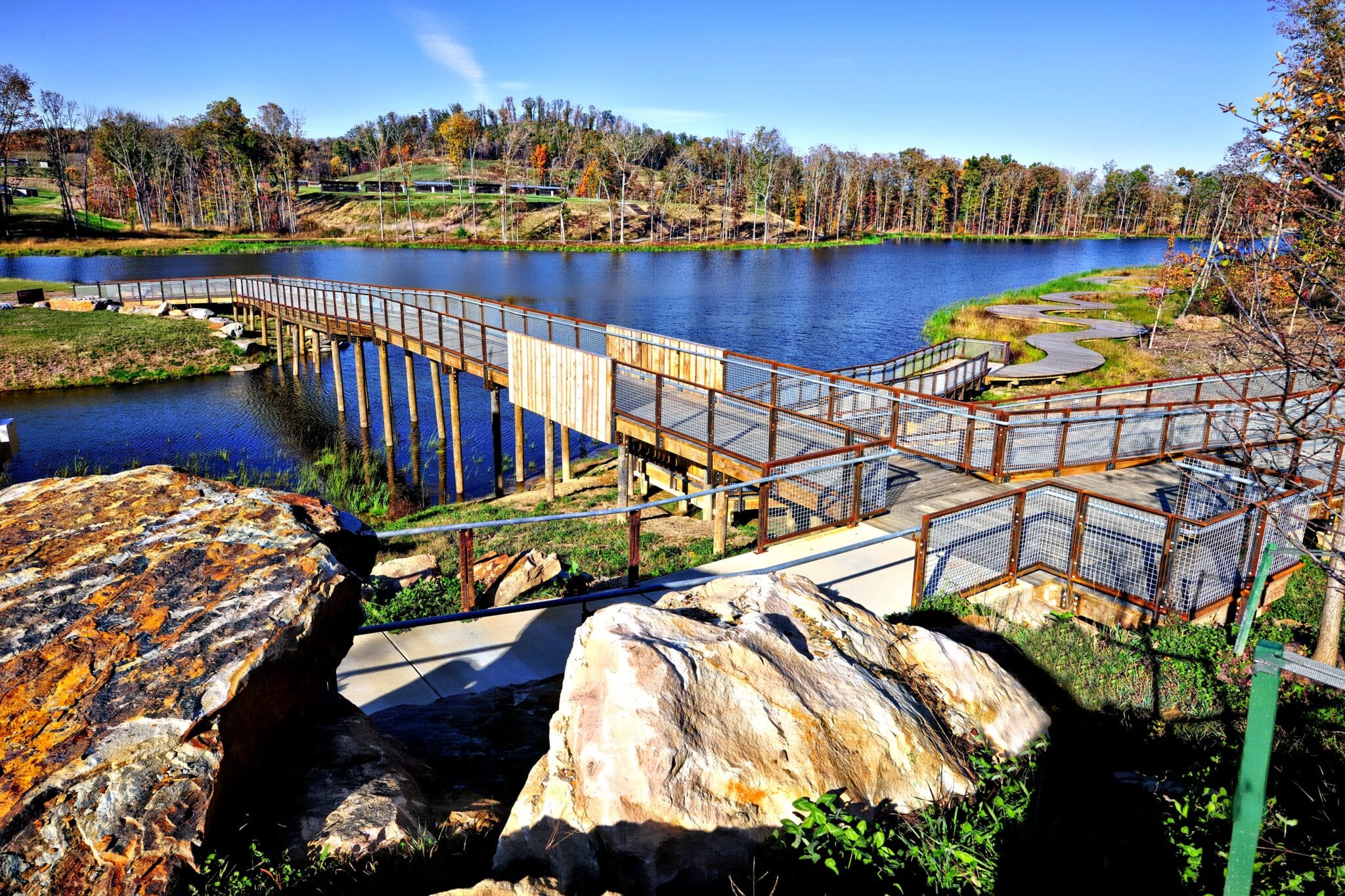
Timber Bridges: Sustainability Meets Durability
The choice of timber for the bridges at Summit Bechtel Reserve was both a nod to tradition and a commitment to sustainability. Timber is one of the most renewable building materials available, with a smaller carbon footprint compared to steel or concrete. Timber bridges blend effortlessly into natural settings, allowing them to complement rather than compete with the surrounding scenery. In addition, timber structures require less energy to produce, are easier to transport, and can be designed to minimize environmental disturbance during construction.
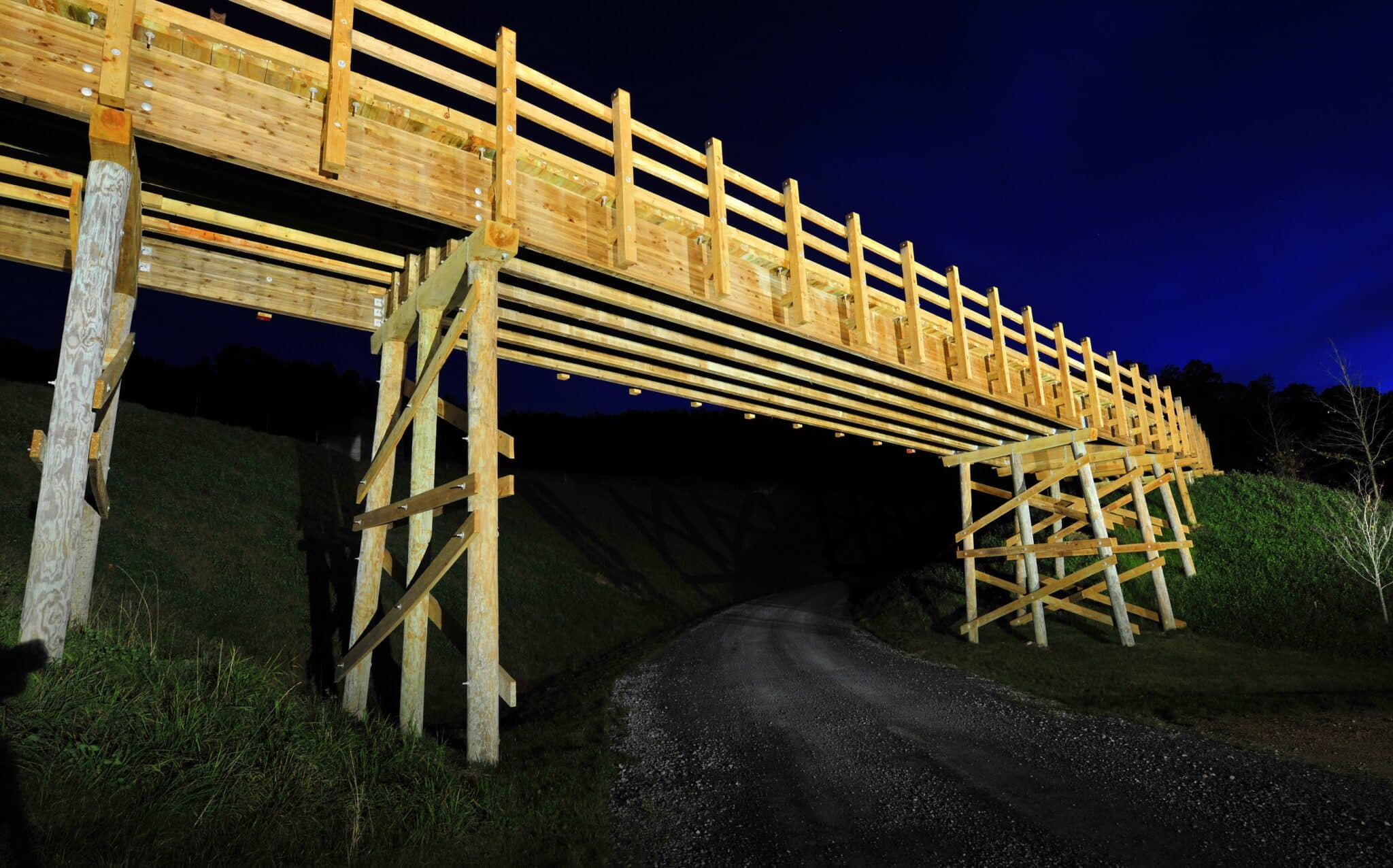
For the Summit Bechtel Reserve project, YBC utilized sustainable timber sources to construct the bridges and boardwalks. Each structure was designed to meet or exceed the AASHTO HS20-44 loading standards, ensuring they could handle the necessary vehicular and pedestrian loads while withstanding the elements over time. Through our specialized coating systems, YBC’s timber bridges are built to resist decay, insects, and harsh weather conditions, providing the Reserve with durable, low-maintenance infrastructure.
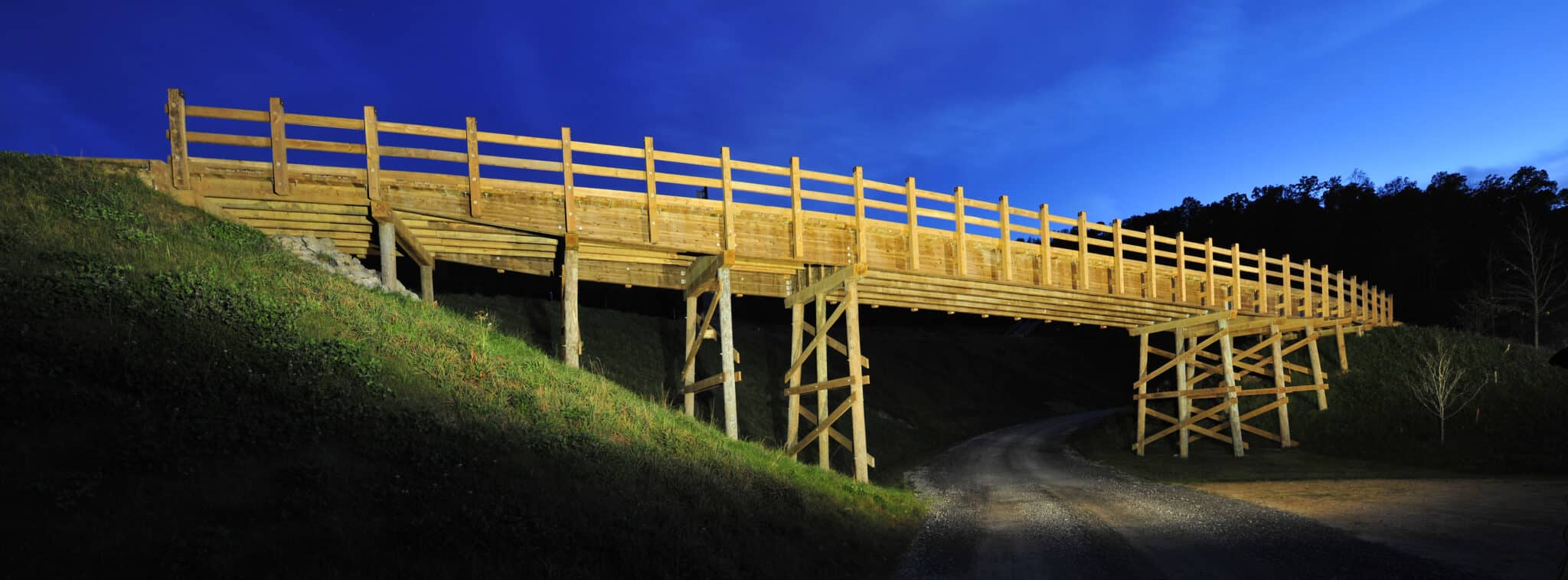
The Three HS20-44 Vehicular Bridges To Connect Summit Bechtel Reserve
Vehicular bridges serve as the backbone of infrastructure at Summit Bechtel Reserve, allowing access to key areas of the property for both maintenance vehicles and visitor transportation. YBC’s vehicular bridges at the Reserve were designed to accommodate HS20-44 loading, a standard that ensures the bridges can safely carry vehicles weighing up to 72,000 pounds. This level of capacity was critical, as the bridges would be used not only by everyday vehicles but also by larger service trucks and emergency vehicles when necessary.
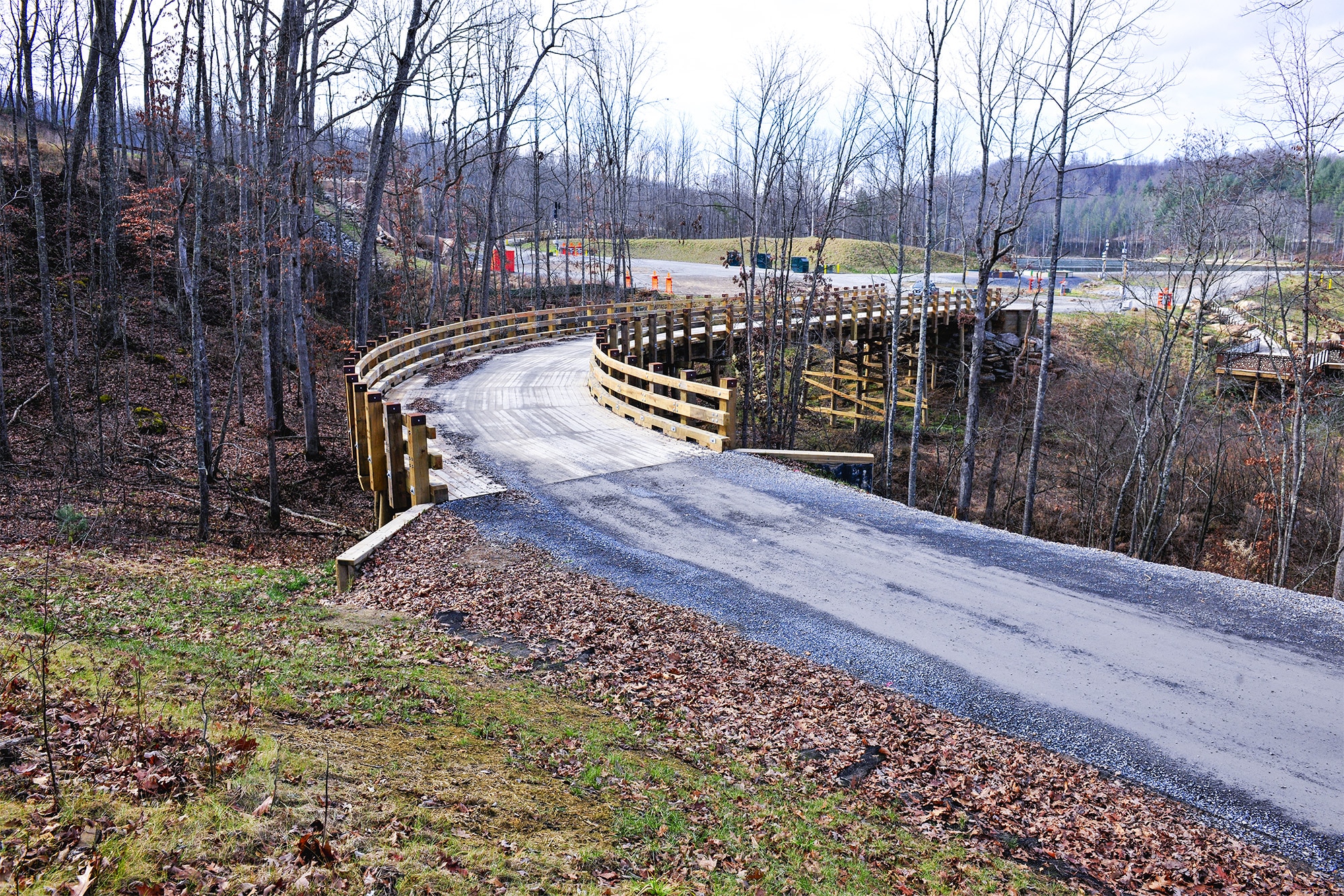
YBC designed and constructed three timber vehicular bridges, each positioned strategically across the Reserve to enhance connectivity without disrupting the natural environment. These bridges allow vehicles to cross over streams, valleys, and rugged terrain, ensuring that the flow of traffic can continue without disturbing sensitive ecological areas.
Each bridge was designed with YBC’s signature craftsmanship, featuring natural finishes that blend seamlessly with the surrounding wilderness. The combination of robust structural design and aesthetic integration makes these vehicular bridges both functional and visually appealing.
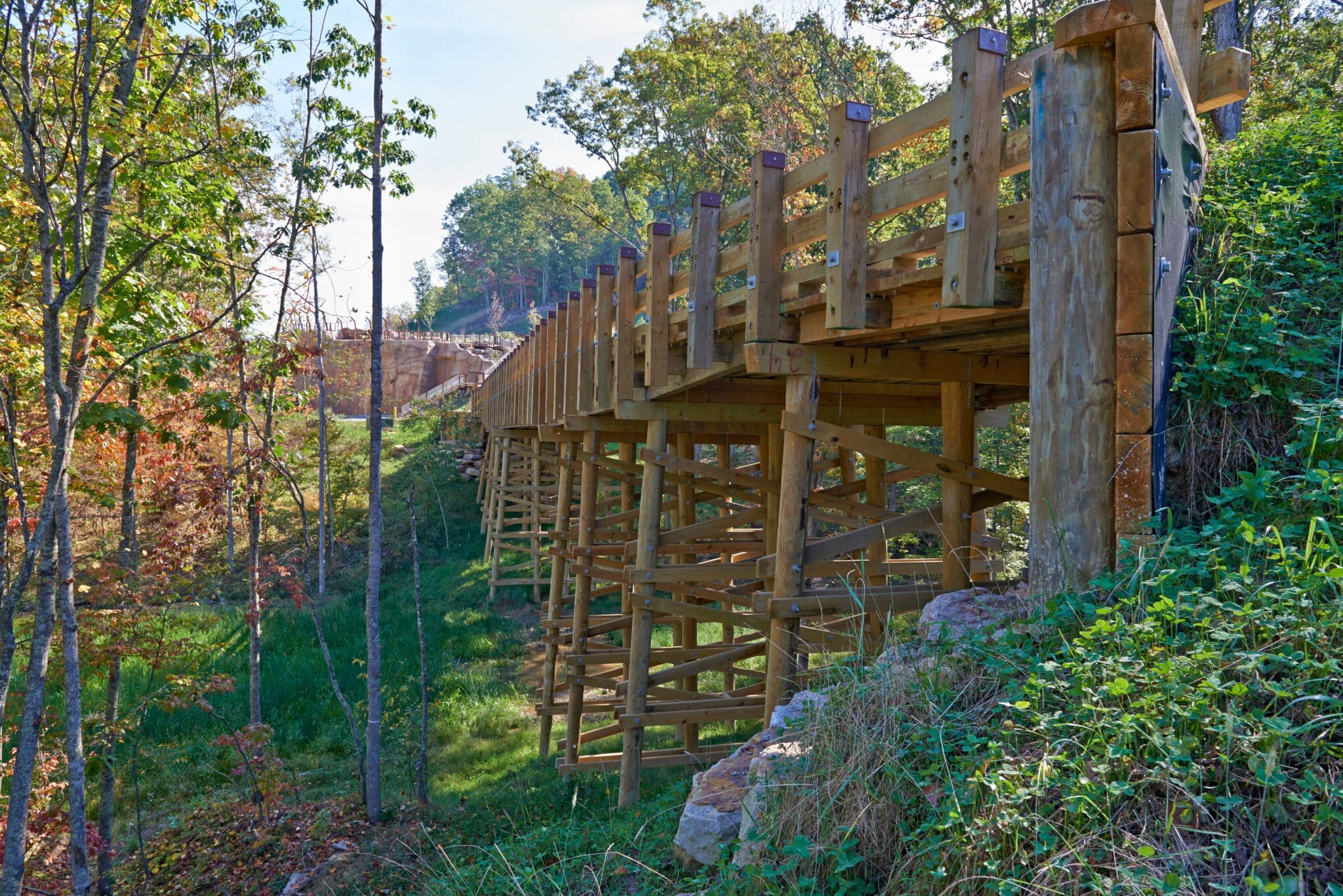
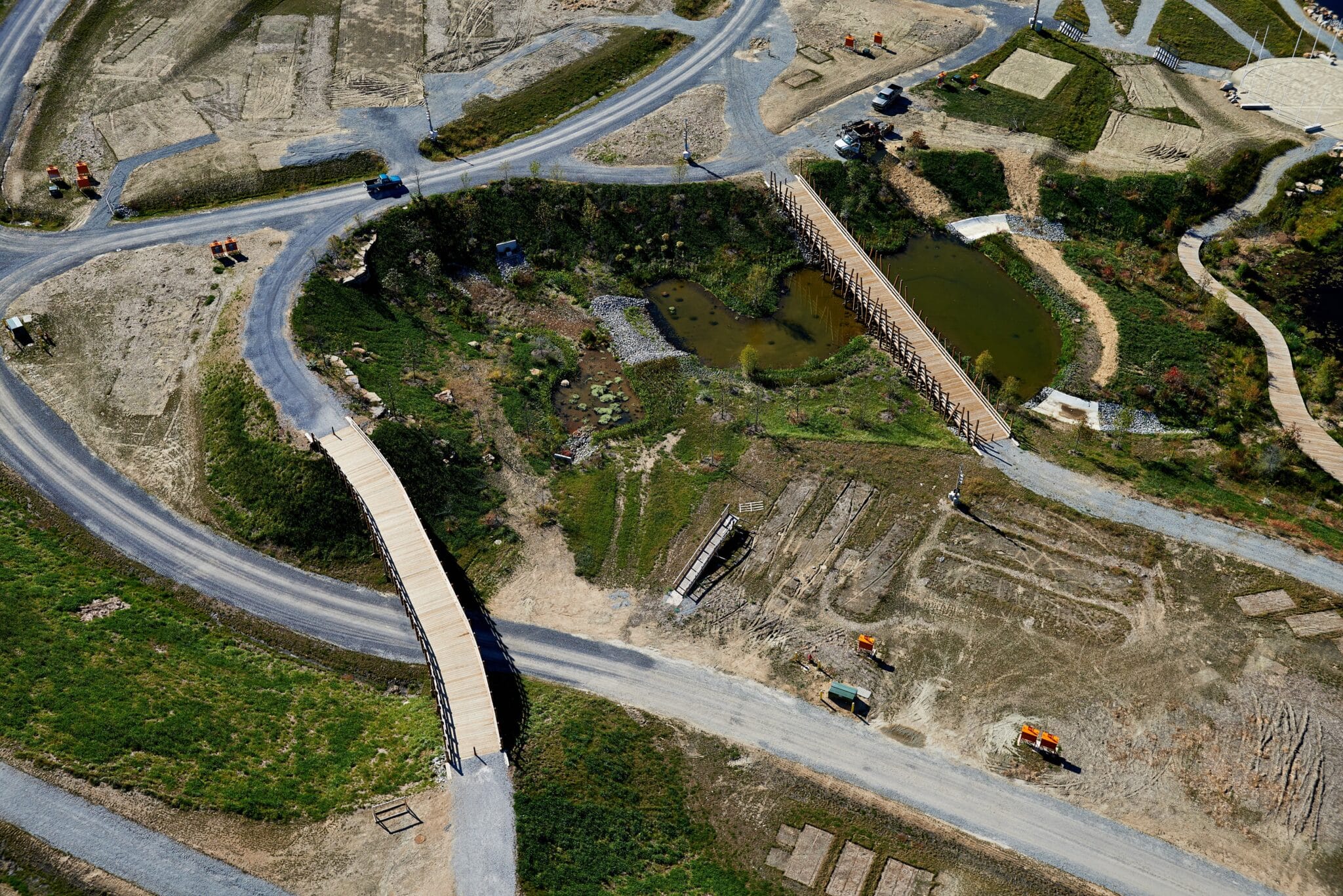
Seven Pedestrian Bridges: Connecting the Heart of the Reserve
Pedestrian bridges were an essential component of the project, as the Reserve’s expansive trail network connects participants to numerous outdoor activities and educational areas. With safety and environmental preservation in mind, YBC designed seven pedestrian bridges that allow scouts and visitors to move freely throughout the property, while preserving the integrity of the land beneath their feet.
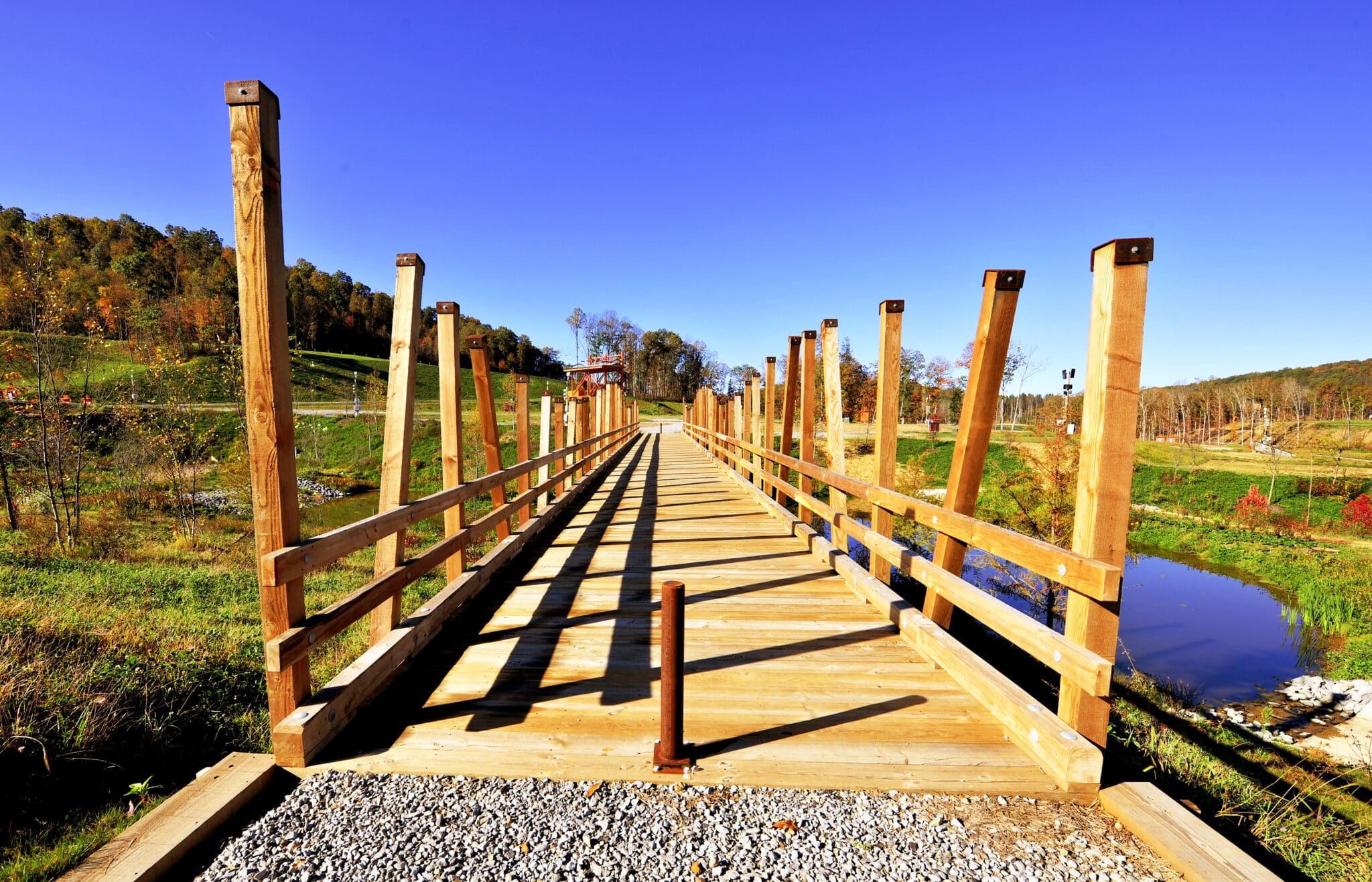
Each pedestrian bridge was tailored to its specific location, taking into account the topography, vegetation, and water flow of the area. These timber bridges, while smaller in scale than their vehicular counterparts, are no less durable or impactful. They provide safe crossings over streams, marshlands, and uneven terrain, ensuring that visitors can access the most remote corners of the Reserve without damaging the natural environment.
YBC’s pedestrian bridges also play a vital role in the Reserve’s conservation efforts. By channeling foot traffic over designated paths, the bridges prevent soil erosion and protect delicate ecosystems from human impact. The use of timber ensures that the bridges maintain a low profile within the landscape, allowing the natural beauty of the Reserve to remain the focal point.
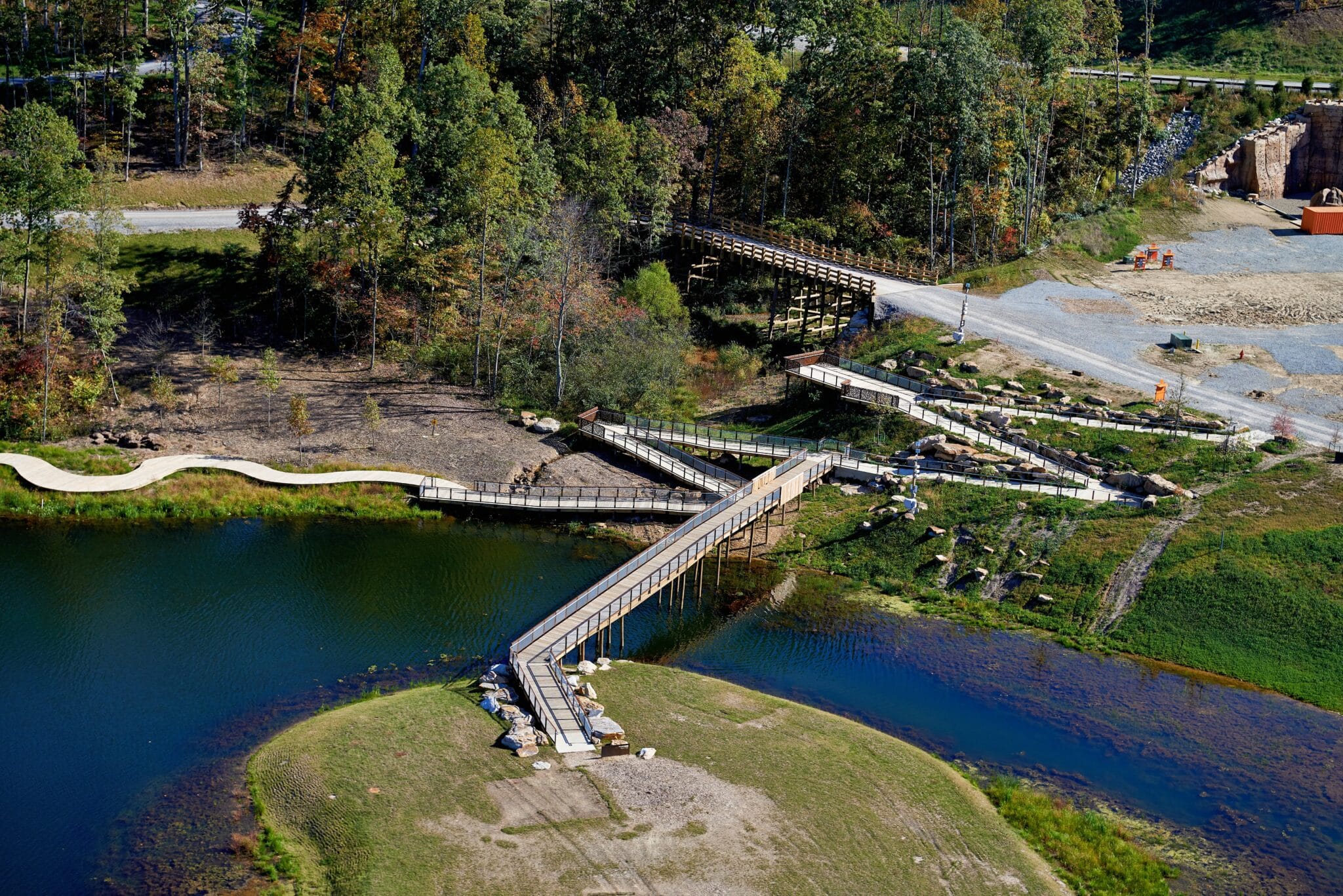
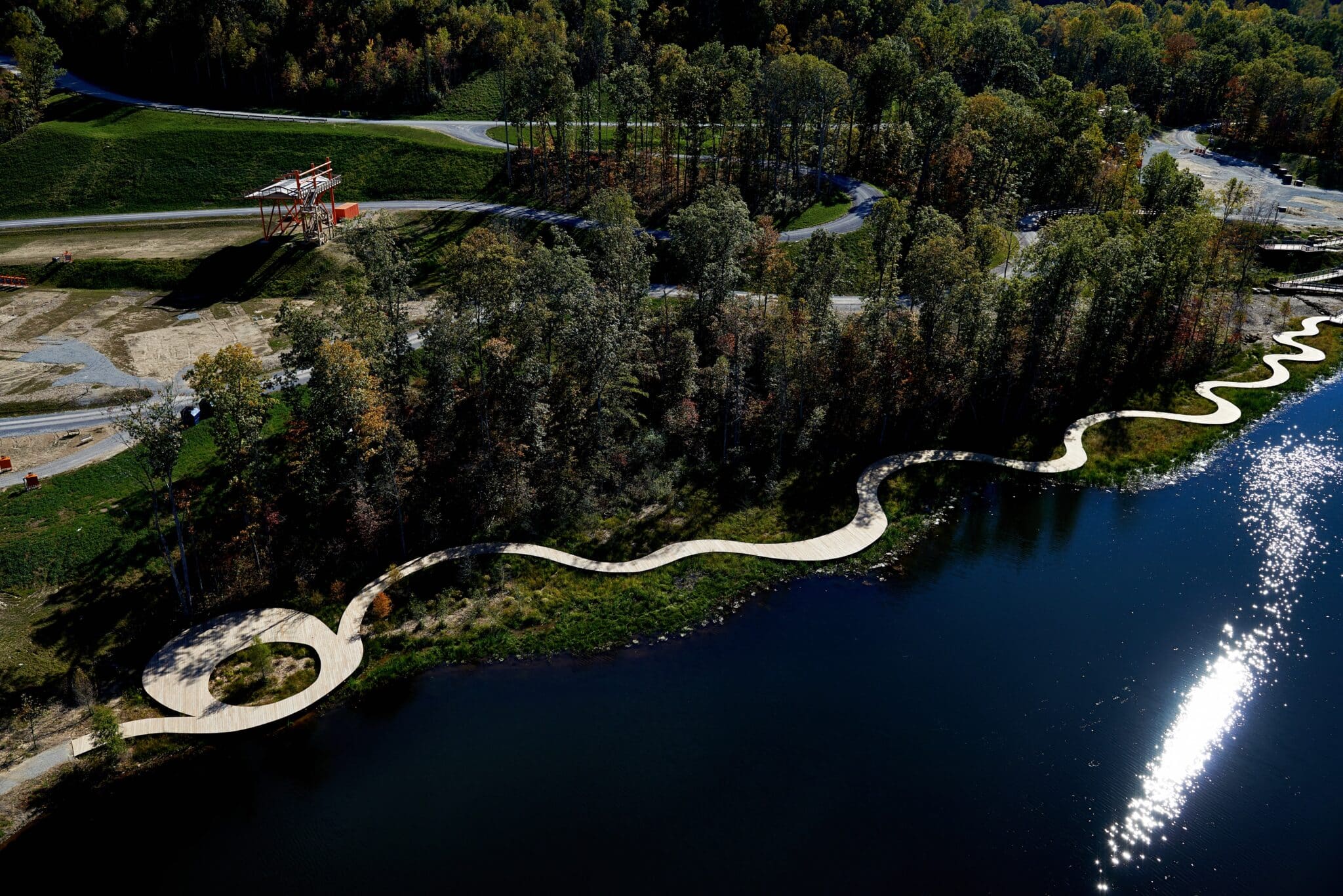
Expansive Boardwalk Systems: Blending Access with Preservation
In addition to bridges, YBC was tasked with designing and constructing timber boardwalks that would traverse the most environmentally sensitive areas of the Summit Bechtel Reserve. Boardwalks offer a unique solution for areas where direct ground contact would be harmful to the ecosystem, such as wetlands, marshes, and other delicate habitats. By elevating foot traffic above the ground, boardwalks allow nature to thrive underneath while providing unobstructed access for visitors.
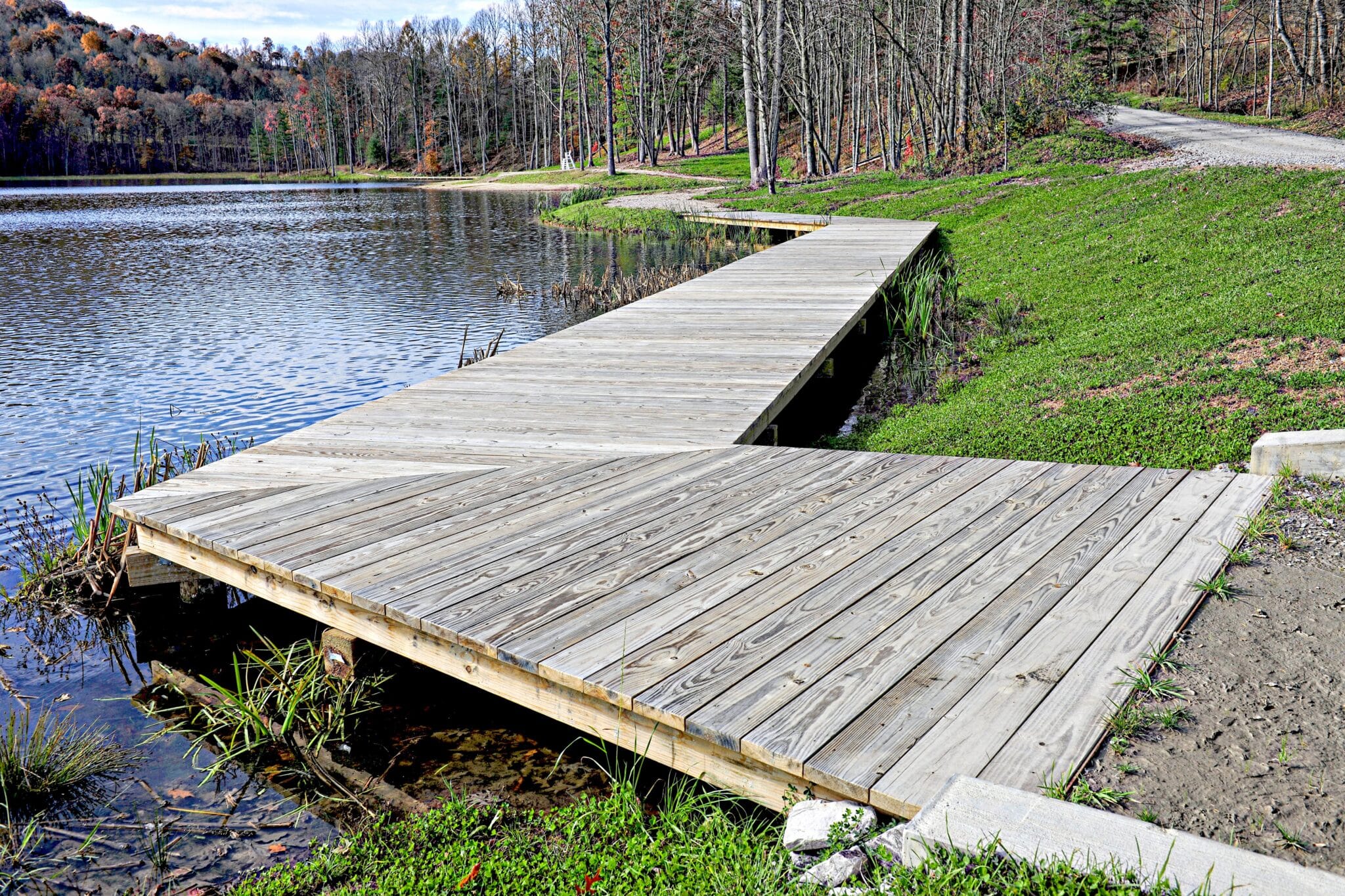
The boardwalks built by YBC at the Reserve not only fulfill a functional purpose but also enhance the overall experience for scouts and visitors. With their natural wood aesthetic and seamless integration into the landscape, the boardwalks invite exploration and discovery while maintaining a minimal environmental footprint.
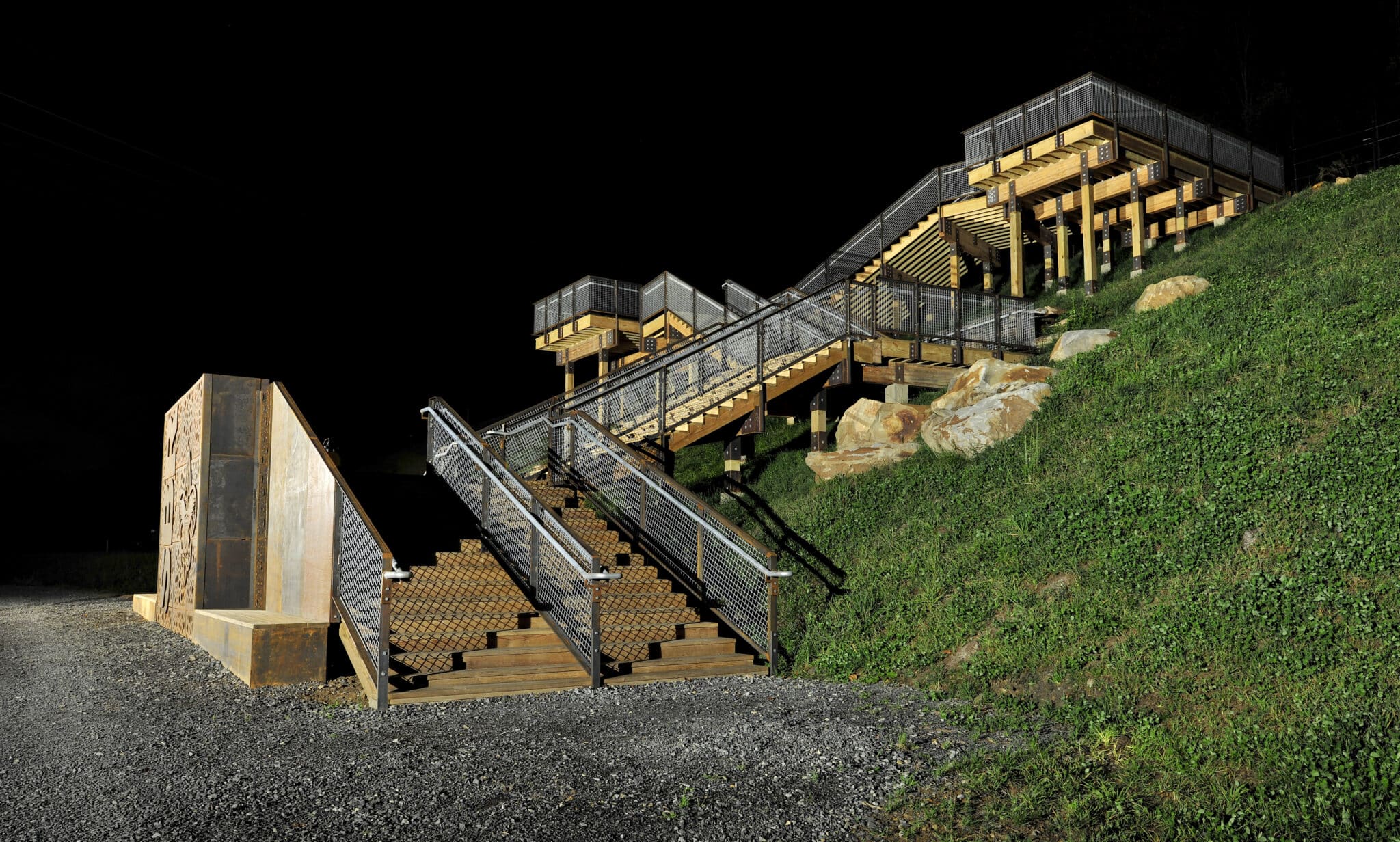
Building for the Future: YBC’s Commitment to Sustainability
Sustainability is at the core of everything we do at York Bridge Concepts. The Summit Bechtel Reserve project exemplifies our commitment to creating infrastructure that is not only durable and functional but also environmentally responsible. From the selection of materials to the design and construction process, every aspect of this project was guided by the principles of sustainability and conservation.
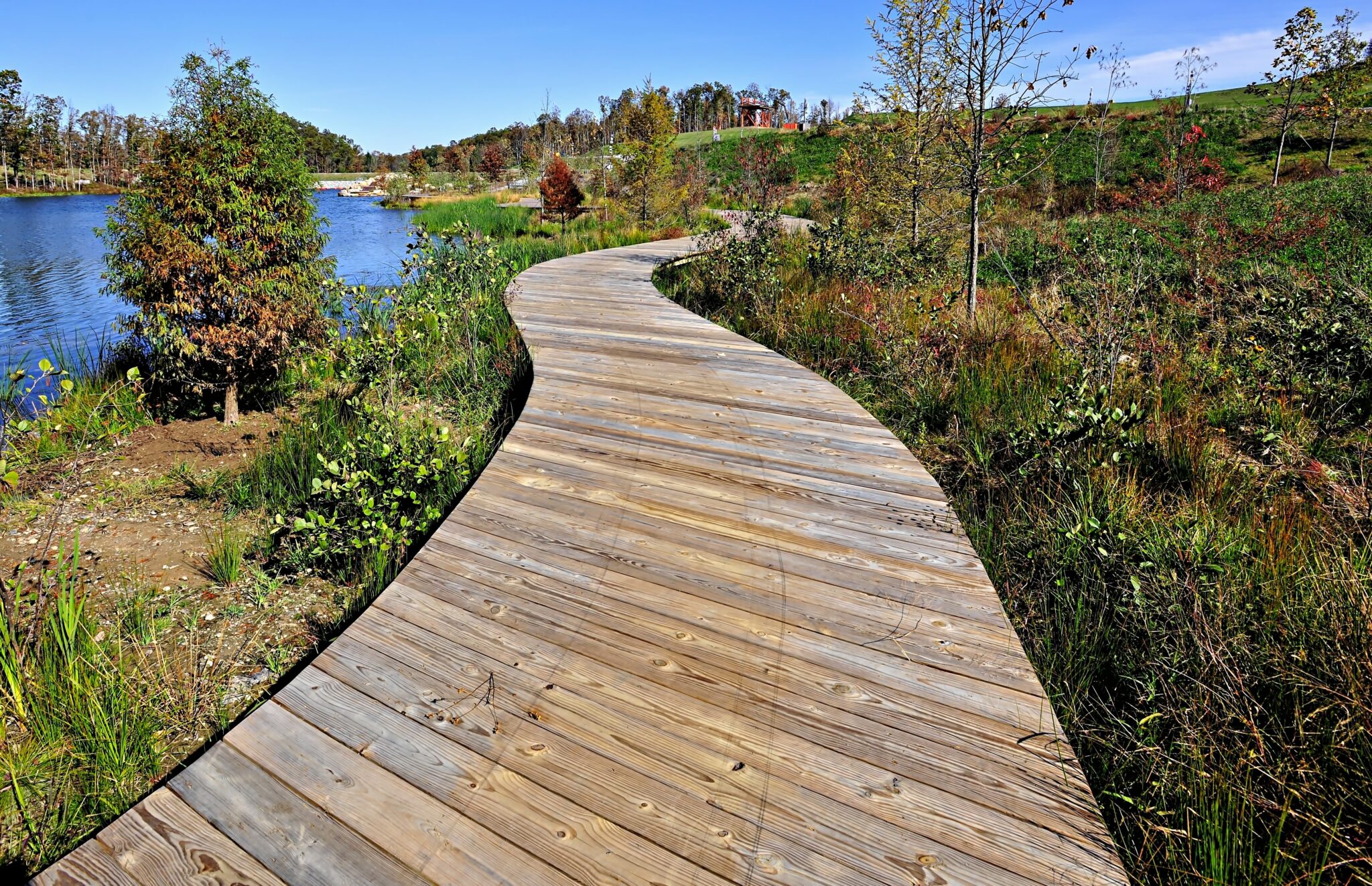
Timber, as a renewable resource, played a critical role in achieving the Reserve’s environmental goals. YBC sources timber from responsibly managed forests, ensuring that the materials we use contribute to the health and longevity of forest ecosystems. In addition, our innovative coating systems protect the timber from weather and insects, extending the life of each bridge and reducing the need for frequent repairs or replacements.
Beyond the materials, YBC’s construction methods were designed to minimize environmental impact. Our team worked closely with the Boy Scouts of America and environmental agencies to ensure that the placement and construction of each bridge and boardwalk would have the least possible impact on the surrounding ecosystems. By utilizing low-impact construction techniques, we were able to preserve sensitive habitats while providing the Reserve with the infrastructure needed to accommodate large numbers of visitors.
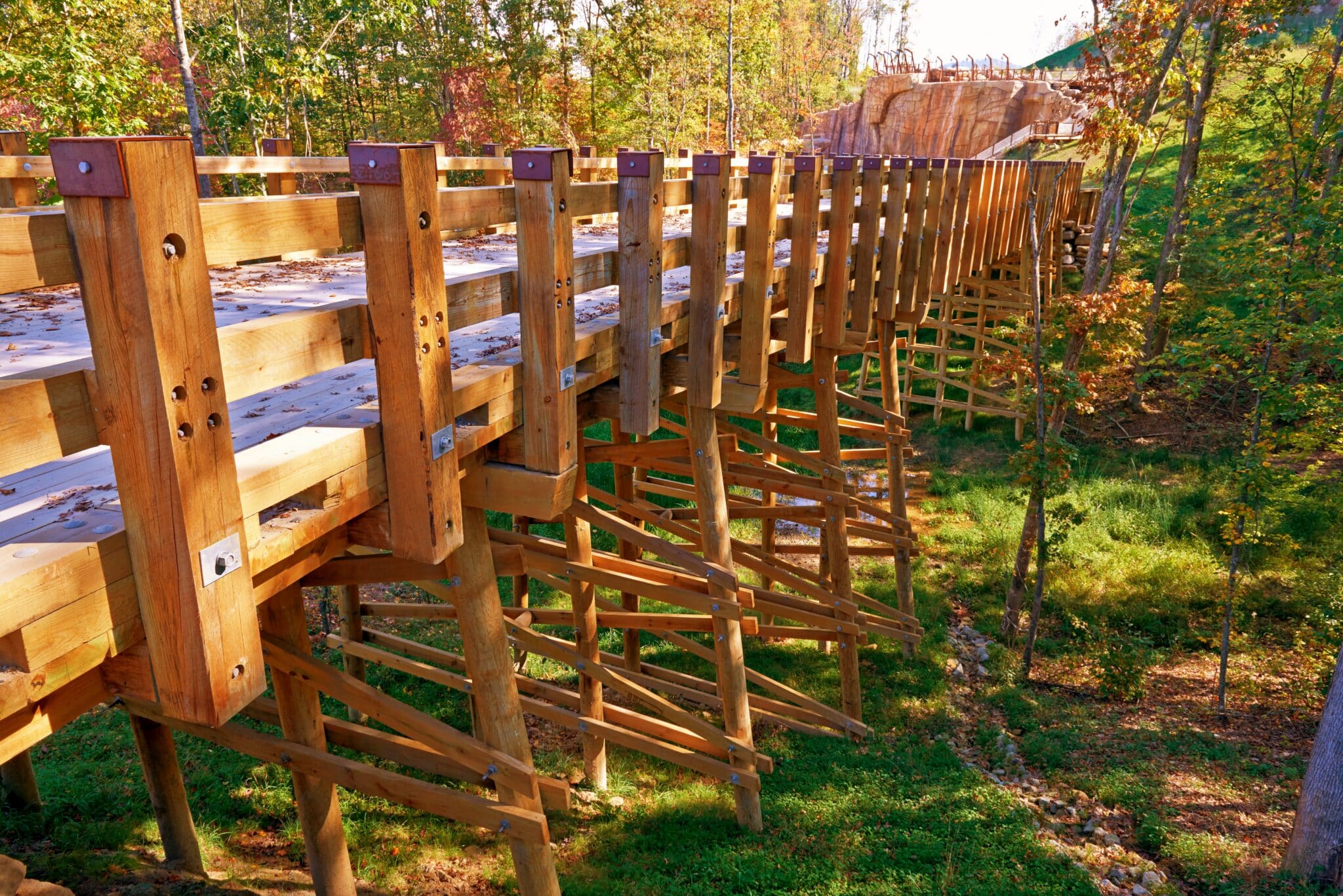
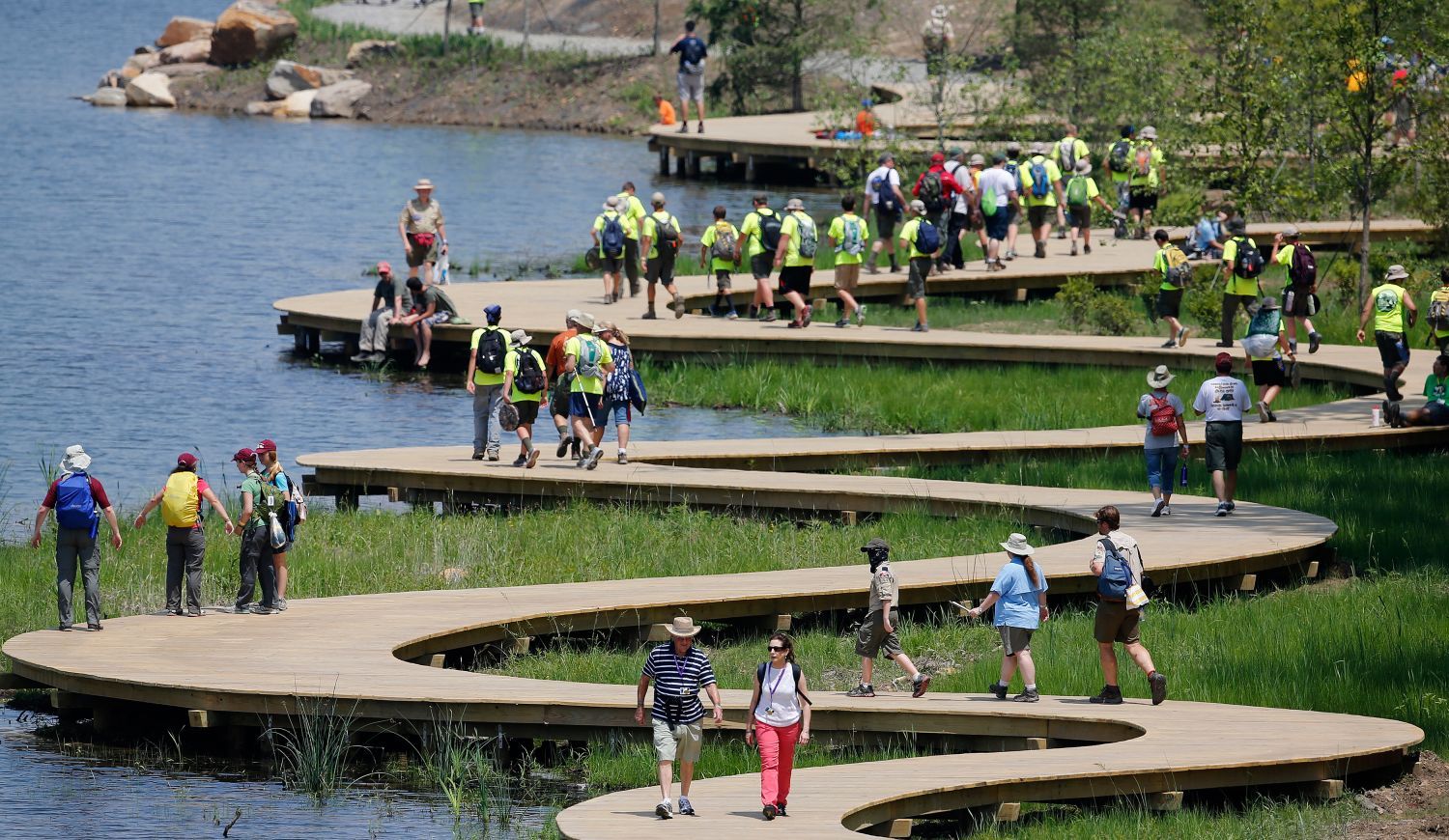
Photo courtesy of Nelson Byrd Woltz | Boy Scouts of America
Crafting Experiences: The Legacy of York Timber Bridges at Summit Bechtel Reserve
The bridges, boardwalks, and other timber structures that YBC built for the Summit Bechtel Reserve are more than just functional components of the infrastructure—they are an integral part of the Reserve’s identity. Each bridge invites scouts and visitors to embark on their own journey of exploration, connecting them to the natural world in a way that is both immersive and respectful of the environment.
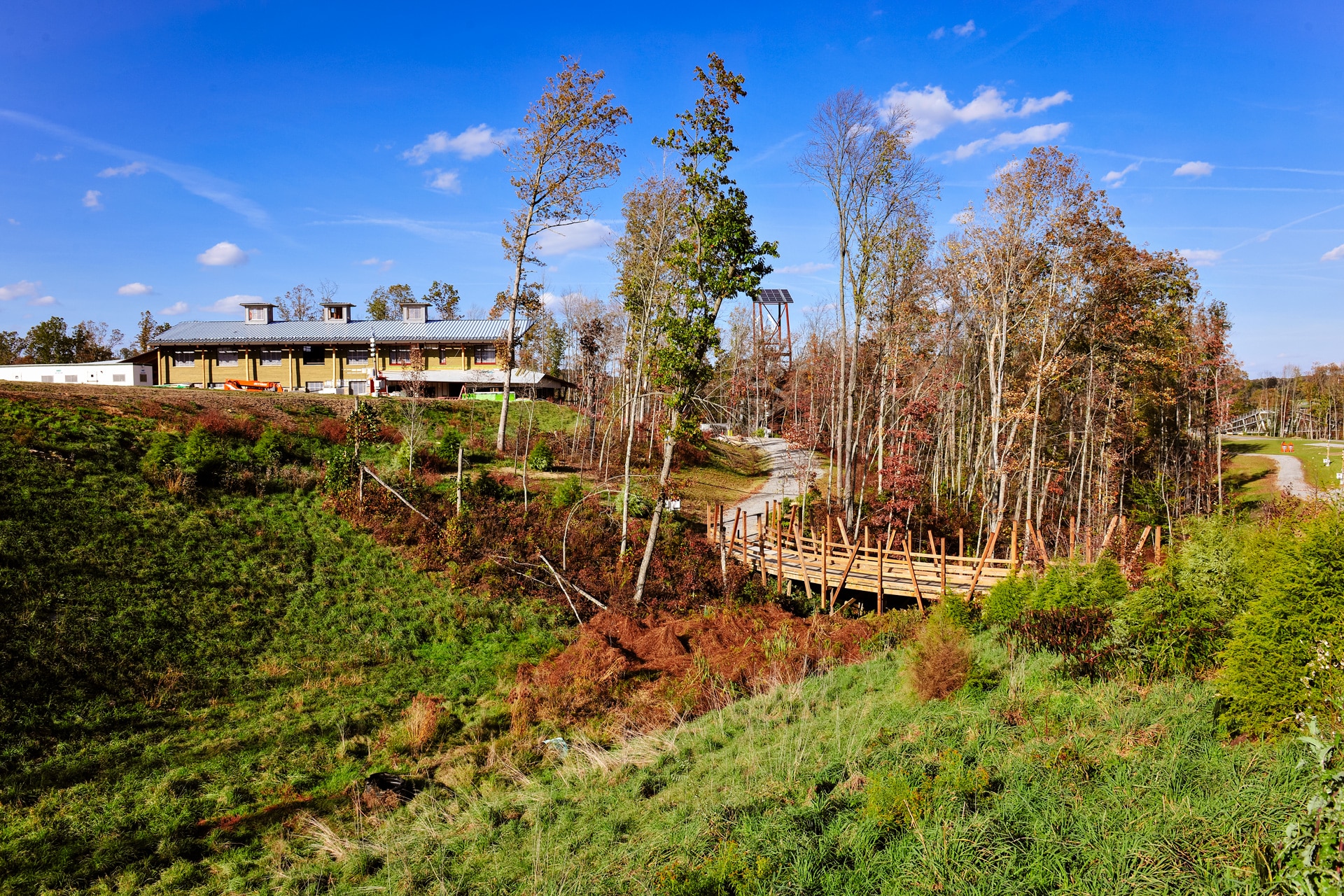
As a company that has built its reputation on quality craftsmanship and environmental stewardship, YBC is proud to have contributed to the legacy of the Summit Bechtel Reserve. Our timber bridges and boardwalks provide lasting access to the Reserve’s natural wonders, allowing future generations of scouts and adventurers to experience the beauty of the Appalachian Mountains while learning the values of conservation and sustainability.
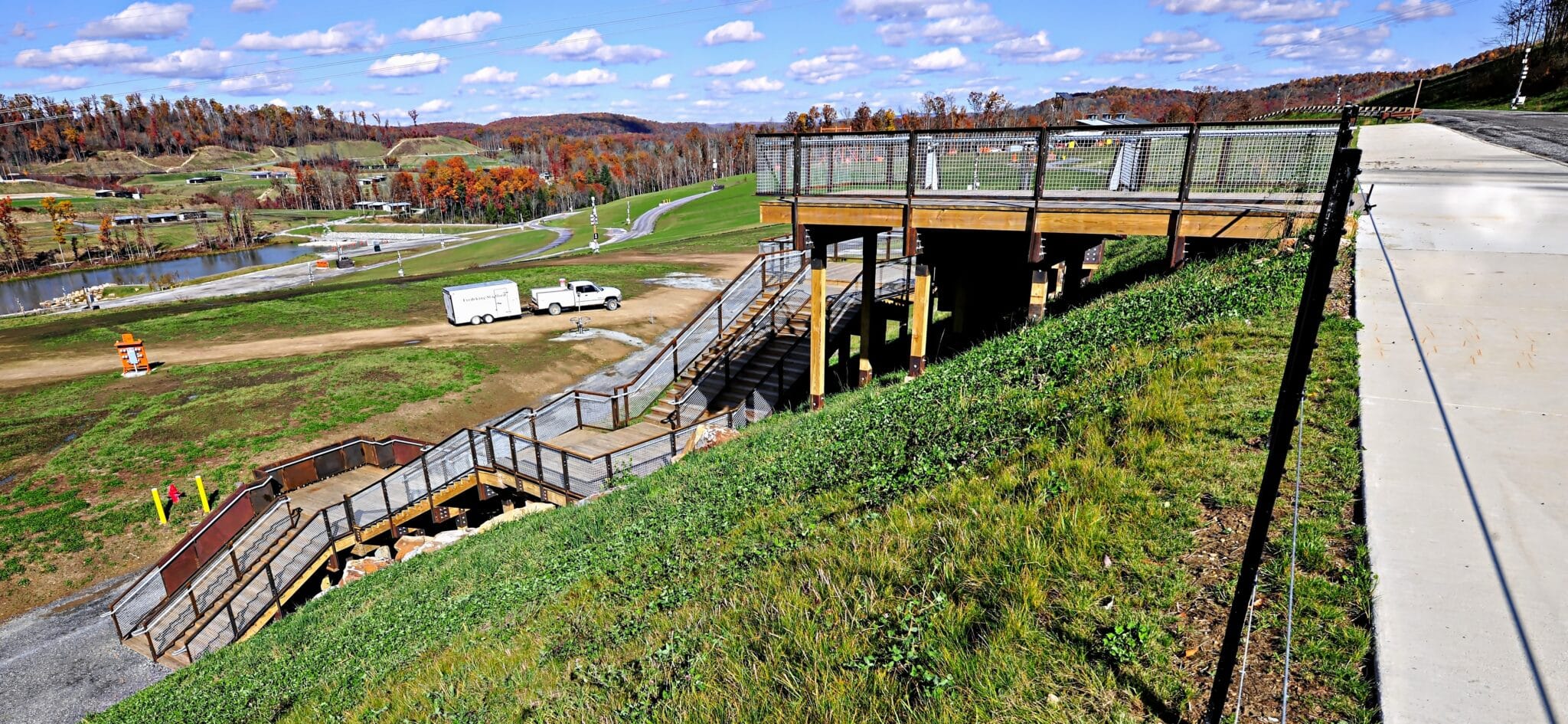
YBC’s Impact Beyond the Reserve
The Summit Bechtel Reserve is just one example of YBC’s commitment to building sustainable infrastructure in some of the most pristine natural settings. From national parks to private estates, YBC’s timber bridges can be found in a variety of environments where aesthetics, functionality, and environmental responsibility must coexist.
Each project, like Summit Bechtel Reserve, reflects our dedication to preserving the beauty of nature while providing safe and reliable access to it. As more organizations prioritize sustainability, YBC’s innovative designs and commitment to responsible construction practices make us a leader in the timber bridge industry.
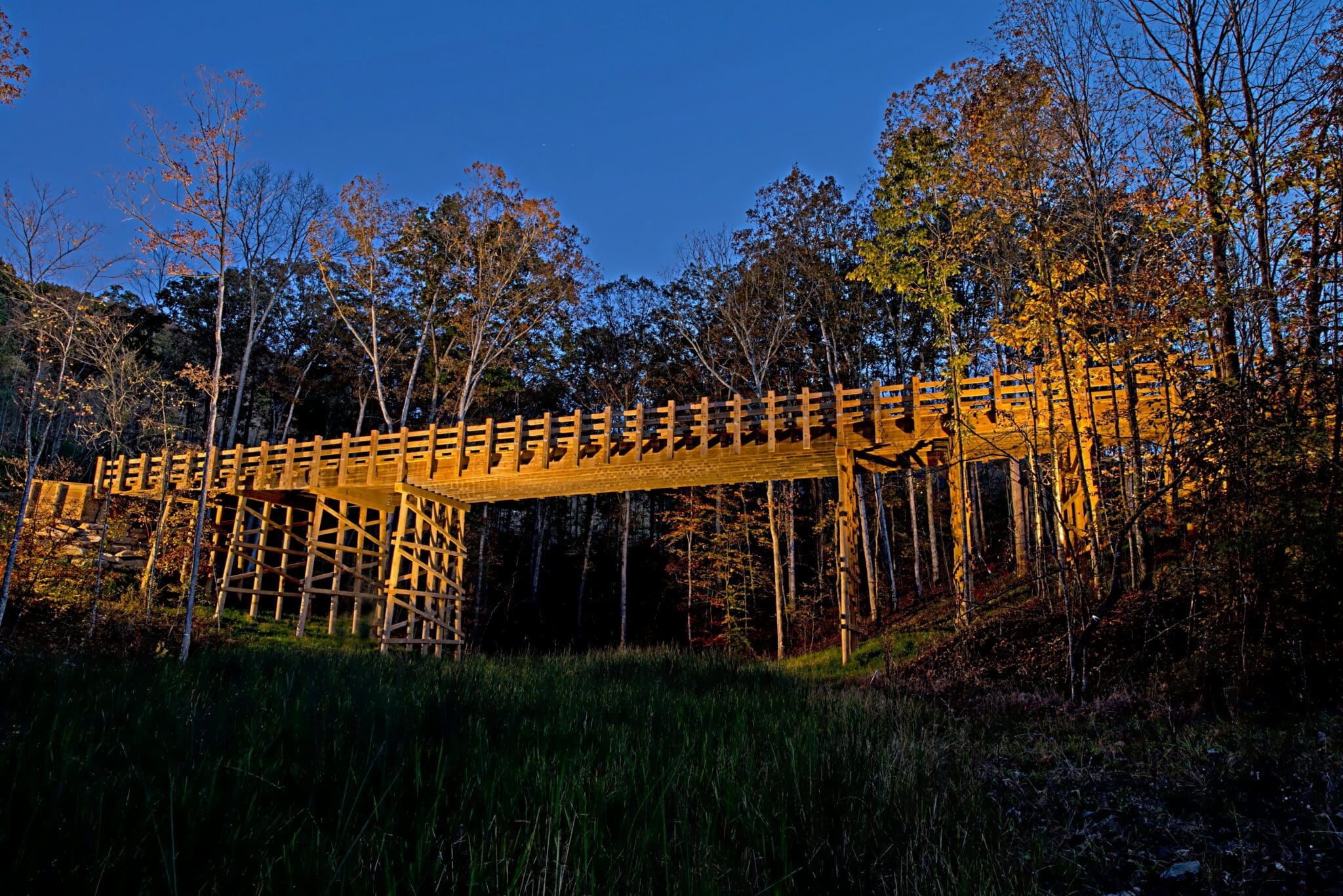
A Lasting Legacy of Adventure and Conservation
York Bridge Concepts’ work at the Summit Bechtel Reserve is a testament to the power of thoughtful design and sustainable construction. By combining modern engineering standards with environmentally conscious materials and techniques, we were able to create structures that not only serve the needs of today’s adventurers but will stand the test of time for generations to come.
The Summit Bechtel Reserve is now equipped with the infrastructure necessary to accommodate thousands of scouts and visitors each year, all while maintaining the delicate balance between human activity and environmental preservation. YBC’s timber bridges and boardwalks have become an integral part of the Reserve’s landscape, providing a gateway to adventure while upholding the values of conservation and sustainability.
As we look to the future, YBC remains committed to building bridges that connect people with nature in meaningful and responsible ways. The Summit Bechtel Reserve is a shining example of what can be achieved when innovation and environmental stewardship come together, and we are proud to have been part of this remarkable journey.
Get Started With Your Project?
All Feature Projects
What's Best: A Culvert Or A Timber Bridge?
What Is The Best Span Type For My Project?
Which Load Capacity I Need?
How Do I Cross An Environmentally Sensitive Area?
How Do I Create A Landmark?
How Long Does A Timber Bridge Last?
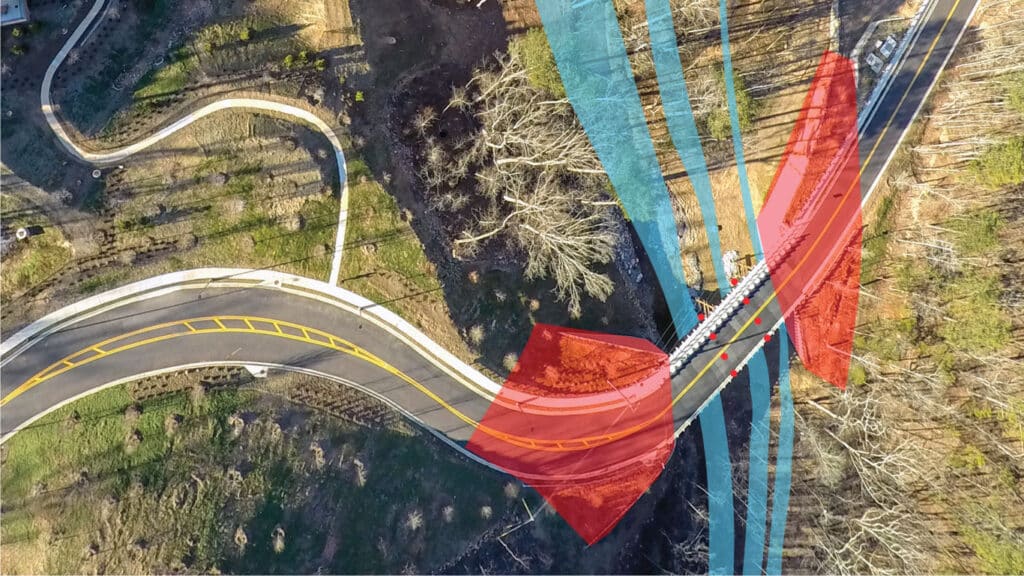
Culvert Or Bridge
If you're considering using a culvert for your crossing project. Click below to understand the best fit for your project.
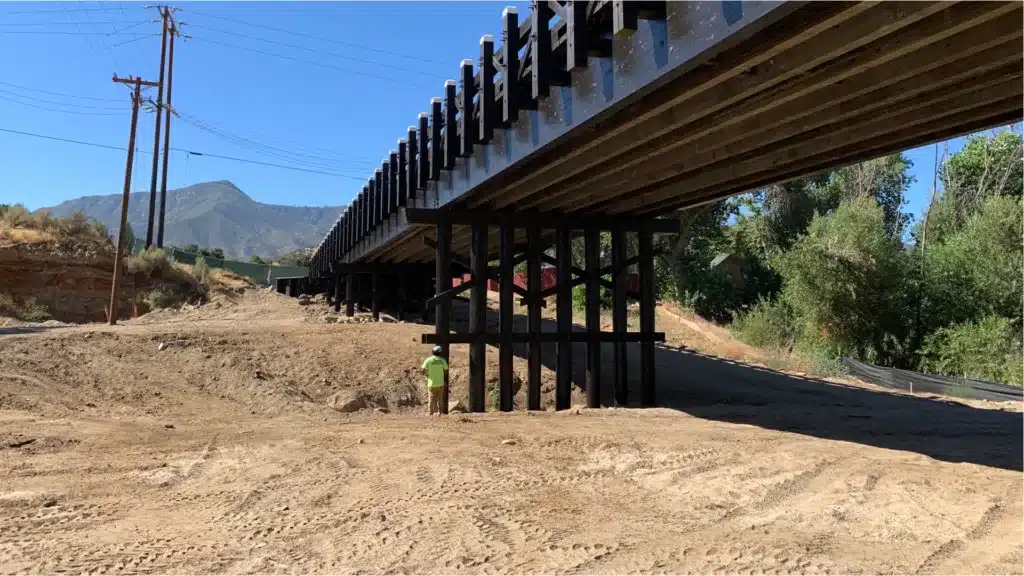
Spanning Solutions
Spanning a crossing is one of the most important aspects of your crossing project. Find the best solution for your crossing needs.
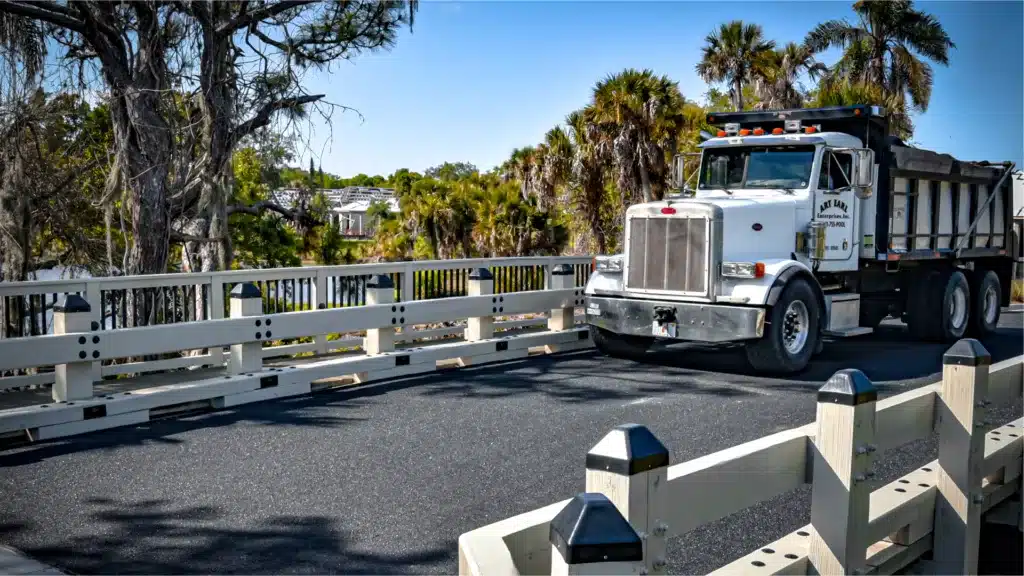
Uses & Capacities
The load capacity of a timber bridge may surprise you. See specs for different loads and uses that will help your decision-making process.

